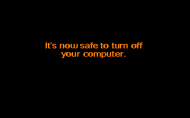I guess it all depends on where you started.
If you have invented (or at least started using) Multics and PL/I, you might
use Debian Linux. I myself started my journey through computing with Windows 3.11, QBASIC and Turbo Pascal and almost always had at least one Windows installation ready. (There was a brief phase around 1998 when I had a Linux-only desktop. But that didn't last long). On 22 March this came to an end.
Sometime in the autumn of 1996, not-quite-as-old Tuxman decided to squander his savings, which were considerable by the standards of the time, by buying one of the PCs that were on the upswing at the time. It was a 133 MHz tower with a gigantic 1.2 GB hard drive. I had upgraded the RAM from 16 to 64 megabytes. That should last until the end of my days. I was so naive. At school, we - "we" were a voluntary working group, computers were not yet compulsory teaching material back then - used Windows 3.11, DOS and a strange hobbyist system called Linux, which was really awful to use back then. At least that hasn't changed since then. I already had the still new Windows 95 and was thus at least suddenly a less unpopular classmate. A school friend already had a keyboard, but he didn't have the money for the rest.
I was playing Rayman and Tomb Raider (1 and 2) and kept deleting system files because I wanted to see what would happen. Not a month went by without a repair, until at some point I got fed up with it and wanted to be able to get the system working again myself. In the meantime, I programmed mainly in Visual Basic and wrote batch scripts. Visual Basic 6.0 was to remain my last version, then I started learning C++. I found the Visual Basic syntax insufficient, and the still young .Net (which I was able to test in a beta version) presented me with too many questions, especially this one:
What am I supposed to do with it? - I can't stand not knowing something. A few computer generations, programming languages learned, operating systems used and jobs held later, I earn my living essentially with Dart/Flutter and C#, I look back on it and wonder how it all could have happened.
My main machine was a dying ASUS gaming laptop, although I'm not a gamer. Gaming computers have the advantage that they can provide decent computing power for us developers to compile. It costs power and is noisy as hell, but you don't have to take a nap while a medium-sized Rust application runs through Cargo. "Was", because I retired the laptop yesterday.
As someone who prefers to use the latest software rather than the most stable, I also became a Windows Insider (that's what Microsoft calls its unpaid beta testers), so I had Windows 11 before the official release. Ha! - However, although I liked Windows Vista and Windows Me myself, I can hardly find anything positive to say about the development of Windows. From Windows 8 onwards (which I had consistently skipped at home until they had eliminated the worst problems with Windows 8.1), Microsoft seems to have little interest in satisfying us long-time "power users". The "Metro" Windows apps introduced with Windows 8, now called "UWP", are inconsistently distributed over the entire system, there are two apparently completely separate control panels, the performance improved with Windows 10 has again dropped noticeably - it is no longer
fun to use Windows.
In my search for a replacement for my laptop, I quickly decided that I should use a desktop instead of a stationary laptop (for reasons of desk space) and that I also wanted to move away from Windows.
That's enough. - The decision coincided with the announcement of the new Mac minis, which were supposed to be cheaper than the previous year's models, which was all too inviting for me, who have long since owned both an iPhone and a MacBook. A computer that is enormously inexpensive in terms of performance, with a unixoid system that has been officially supported for years, and which has an impressive performance with - especially in comparison to a gaming laptop - downright tiny energy consumption: I'll take it!
After almost 27 years, an era is coming to an end. I now only use Windows at work - my home is Apple-only now.
This will have little effect on my projects for DonationCoder, most of them run on several operating systems anyway. Only my Universal Formatting Toolbar - which makes intensive use of the Windows API - will probably never appear in a final version. (Did I already publish the alpha version somewhere? Do you want it?) On the other hand, I finally don't have to be annoyed by my oversized music player anymore.
I'm curious to see how this will turn out.
 Windows Club 27: Season's End.
Windows Club 27: Season's End.